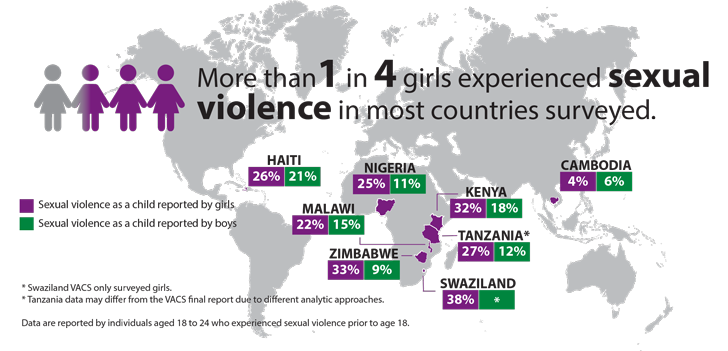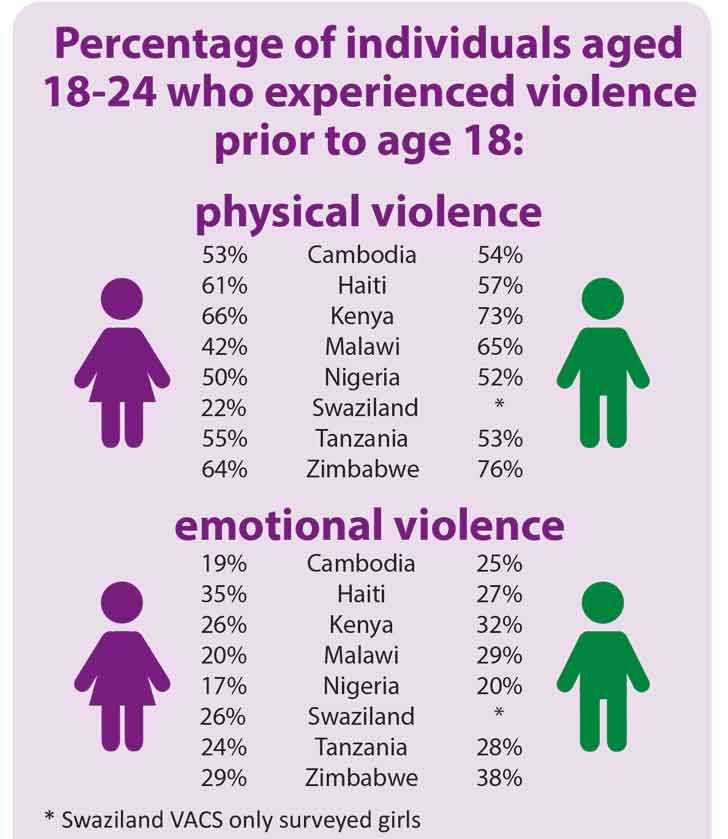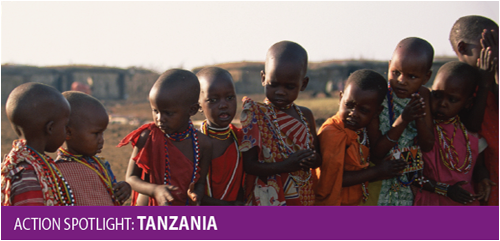Towards a Violence-Free Generation
Using science to fuel action and end violence against children
A first step in preventing violence, is better understanding its magnitude, nature, and consequences. CDC’s Violence against Children Surveys (VACS) measure physical, emotional, and sexual violence against girls and boys. Data have been collected in 14 countries and is ongoing in several more.
More than 1 billion children—half of all the children in the world—are victims of violence every year.

Data Spotlight

Turning Data into Action
The Violence against Children Surveys (VACS) systematically measure physical, emotional, and sexual violence against girls and boys, and identify risk and protective factors and health consequences, as well as use of services and barriers to seeking help.
Children who experience violence are at greater risk for common and destructive yet preventable consequences, including HIV, chronic diseases, crime and drug abuse, as well as serious mental health problems.
Findings from VACS enable countries to better allocate limited resources to develop, launch, and evaluate violence prevention programs and child protection systems.
In the news: CDC releases data from global Violence Against Children Surveys (VACS)
Swaziland

|
Negative Health Conditions | Risk |
|---|---|---|
| HIV/STIs | 3.7x | |
| Pregnancy Complications | 3.5x | |
| Alcohol Use | 3.0x | |
| Unwanted Pregnancy | 2.9x | |
| Feeling Depressed | 2.3x | |
| Suicidal Ideation | 2.3x | |
| Attempted Suicide | 2.0x | |
| Difficulty Sleeping | 1.8x | |
| Cigarette Use | 1.2x |
Zimbabwe

|
Type of Sexual Violence | % |
|---|---|---|
| Unwanted sexual touching | 20% | |
| Attempted unwanted sex | 15% | |
| Coerced sex | 7% | |
| Forced sex | 9% |
*Total percentages exceed 33% reported above because girls often experience more than one type of sexual violence.
Action Spotlight
Tanzania
Tanzania improves programs and services to prevent violence against children

Sparked by the high rates of violence identified by VACS, the Government of Tanzania developed a multi-sector National Response Plan to prevent violence against children that focuses on education, social welfare, legal, justice, public health, and community. The Plan pays particular attention to sexual violence, the vulnerability of girls, and the health consequences of violence.
To see results, Tanzania is launching several new programs and policies, including:
- A new child protection training manual and trainings for government ministries on prevention of gender-based violence and survivors of violence
- Guidelines for budgeting for child protection at the local government level, including child protection guidelines for schools
- A revised national code of conduct for teachers
- A comprehensive pilot program to address child violence in three districts, focusing on school- and community-based prevention, and bringing together police, justice and social welfare for response services
In addition, CDC's office in Tanzania has identified the "Families Matter!" program, an evidence-based intervention designed to promote positive parenting practices and effective parent-child communication about sexuality and sexual risk reduction for parents of 9-12 year olds, as a platform for preventing and responding to childhood sexual violence.
Global Partners
The surveys are implemented under the leadership of country governments with participation from in-country partners and with support from UNICEF and Together for Girls (TfG) partners. Surveys have been completed in six countries and are underway in eight more (map). In addition, many countries continue to express interest in partnering with CDC to complete a VACS. CDC receives financial support for VACS from PEPFAR and from foundation partners through the CDC Foundation.
VACS is part of the Together for Girls partnership (TfG) which focuses on conducting national surveys to document the magnitude and impact of sexual violence, supporting a coordinated response to strengthen violence prevention, and leading global advocacy to promote evidence-based solutions.
Partner List
These partners include:
- Becton, Dickinson and Company (BD)
- CDC Foundation
- Centers for Disease Control and Prevention (CDC)
- Foreign Affairs, Trade, and Development Canada
- Grupo ABC
- Joint United Nations Programme on HIV/AIDS (UNAIDS)
- Nduna Foundation
- United Nations Children’s Fund (UNICEF)
- United Nations Entity for Gender Equality and the Empowerment of Women (UN Women)
- United Nations Population Fund (UNFPA)
- U.S. Department of State
- U.S. Agency for International Development (USAID
- U.S. President’s Emergency Plan for AIDS Relief (PEPFAR)
- World Health Organization (WHO)
CDC's Press Office
For inquiries, contact CDC’s Press Office
Phone: 404-639-3286
Email: media@cdc.gov
- Page last reviewed: December 9, 2016
- Page last updated: December 9, 2016
- Content Source:


 ShareCompartir
ShareCompartir
